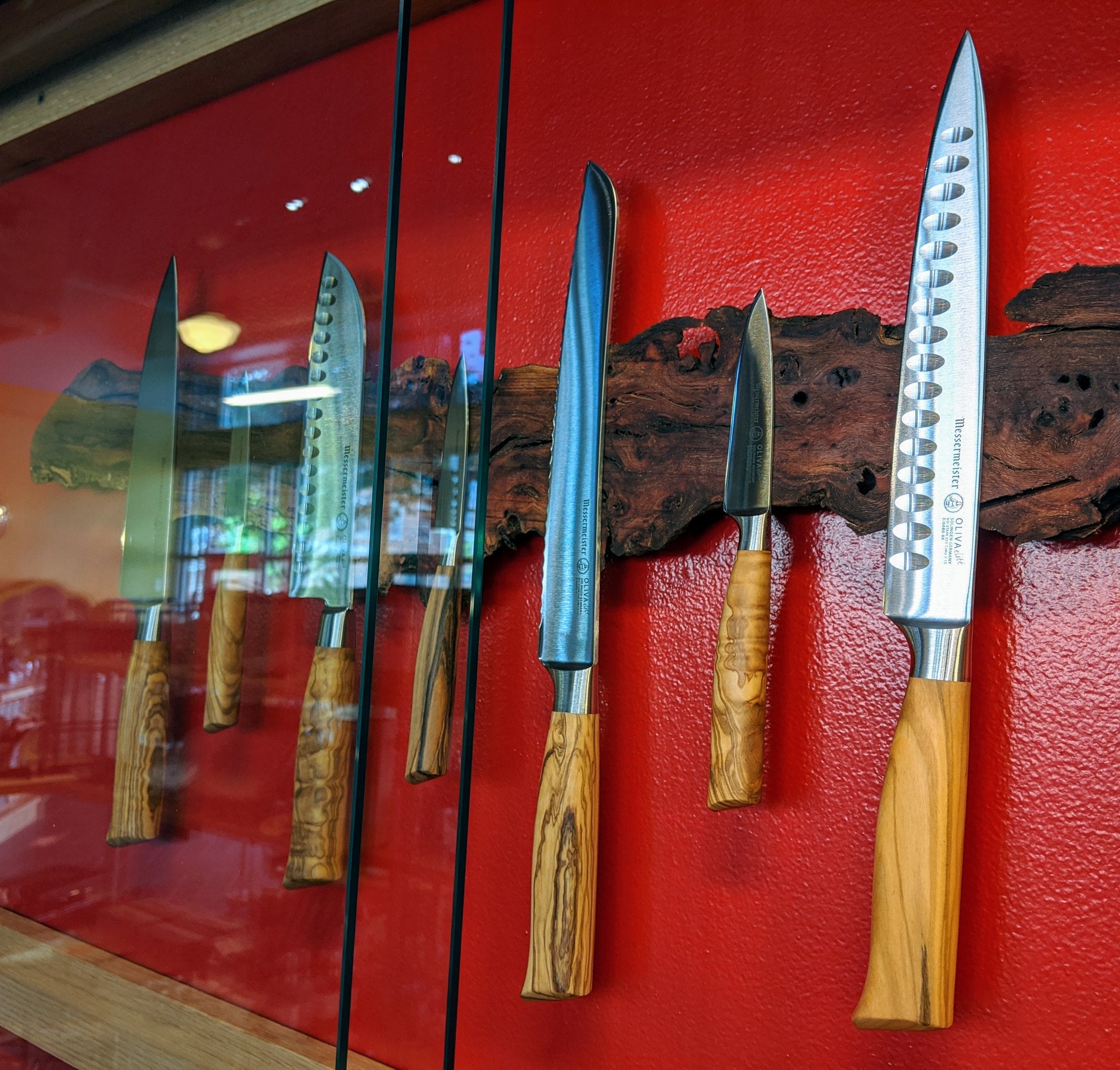
In-Store Knife Sharpening
We are privileged to offer a drop-off knife sharpening service at the Prairie Kitchen Store. Drop your knives off at the store, and we’ll have them sharpened and ready to go for you within two business day’s time. We charge a single-rate fee of $6 per knife. Please read the information below prior to bringing your knives in for sharpening.
Knife Sharpening FAQ's
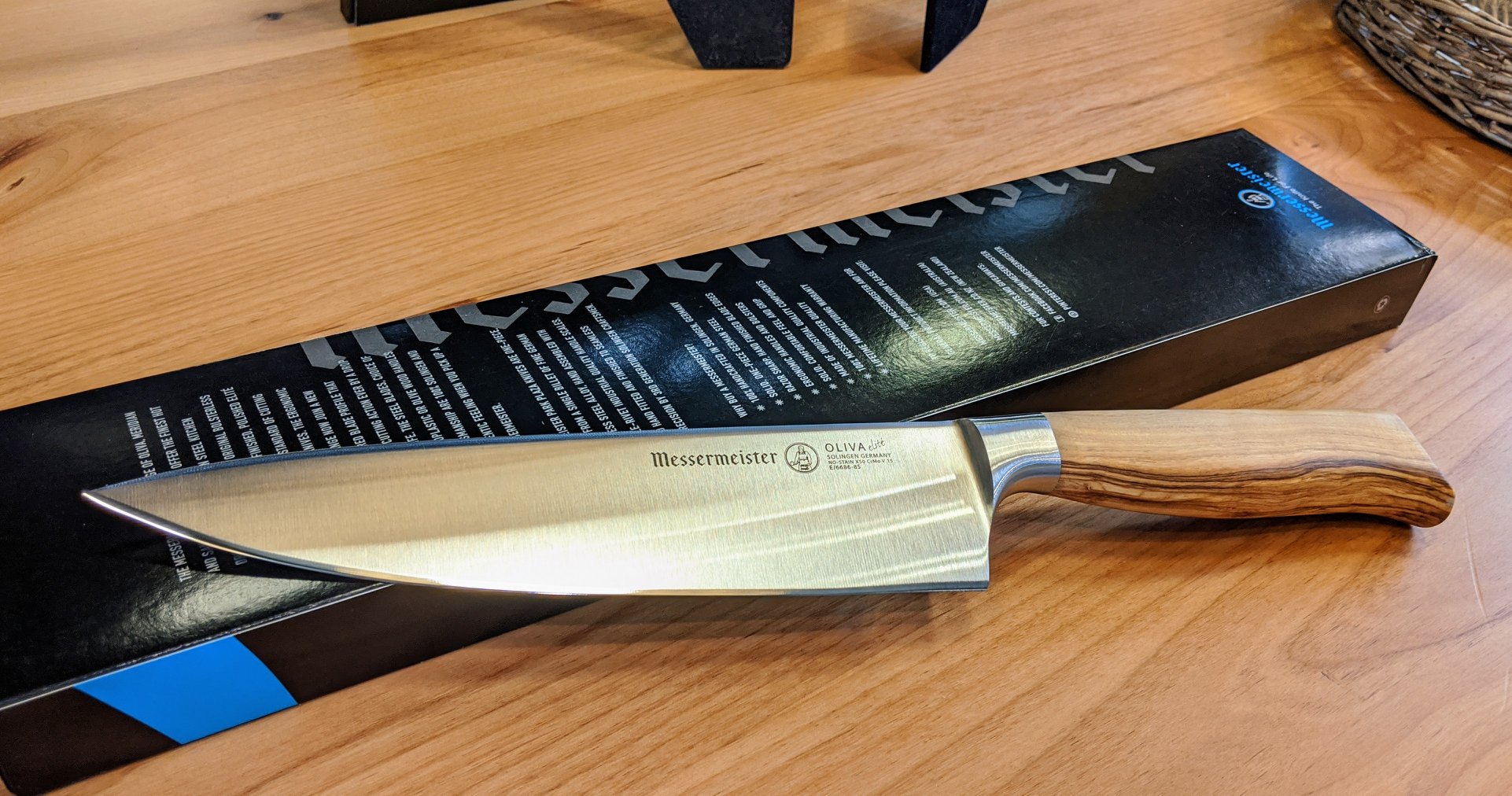
How do we sharpen knives?
We use a Tru Hone 110V heavy commercial knife sharpener to sharpen our knives. Used by professionals in many industries throughout the world, Tru Hone’s sharpener uses two pairs of contra-rotating honing wheels to simultaneously sharpen both bevels of a knife edge. We sharpen all knives to an approximately 30 degree dual bevel (15 degrees on each side), appropriate for the vast majority of kitchen knives on the market.
What kinds of knives do we sharpen?
We sharpen steel kitchen knives, with the exception of serrated knives, knives with blades longer than 14’’ in length (heel to point) or 5’’ in height (spine to edge), bird's-beak knives, and “heirloom” knives (vintage, antique, etc.). We do not restore or repair seriously damaged or chipped knives. We do not sharpen ceramic knives. We do not sharpen scissors, swords or other weapons. We will not accept dirty knives. For single-bevel knives, we can sharpen them, but by doing so will remove the single-bevel and it will become angled on each side.
How does drop off work?
After thoroughly cleaning your knives, safely wrap them (we suggest layers of newspaper, if you do not own edge guards/sheaths) and bring them to the Prairie Kitchen Store anytime during our normal business hours. Our staff will assist you in inspecting the knives, filling out our receipt form, and making payment at the time of drop off. We charge a single-rate fee of $6 per knife.
How does pick up work?
We will call you when your knives are ready for pick up, no later than two business days after drop off. Your knives will be returned in cardboard sheaths.
How often should I have my knives sharpened?
We suggest you have your knives professionally sharpened at least once every 6 months, depending on how often they are used. You can test your knives’ sharpness by holding the edge to a piece of paper, and cutting downward. It should easily slice through most types of paper, with few stutters or drags.
Is there anything I should do when I get my knives home?
Clean your knives thoroughly with soap and water before using them. If any of your knives have wood handles, we suggest regularly moisturizing the handles with a food-safe wood oil.
How should I take care of my knives at home?
Clean and dry your knives in between every use, and store them safely in some kind of knife block, draw organizer, magnetic strip edge guard, sheath, etc. Touch up the edge of your knife in between sharpenings with regular use of a honing rod.
Are sharp knives really that important?
Beyond making your cutting work easier, faster and more pleasant, a sharp knife is much safer to use than a dull one. The scientific reason for this phenomenon has to do with something called force exposure. The sharper your blade, the less downward force you must use to cut whatever it is you’re using the knife on.
The duller your blade, the harder you have to push down to make a cut. The harder you press, the more likely your knife is to slip or get out of control. So, if your knife slips as you’re pushing in an attempt to cut through a vegetable or piece of meat, you’re more likely to cause significant injury if the blade comes into contact with your skin. If you do accidentally cut yourself with a sharp knife, the cut will have clean edges. A clean cut often heals very quickly if you clean it and apply a clean bandage. A dull knife, on the other hand, creates a jagged wound more like a tear than a cut. These wounds, if severe, often require stitches.
What is the difference between sharpening and honing?
Sharpening a knife entails removing material from the edge of the blade, changing the angle itself. This is typically done on a whetstone, or with a commercial sharpening machine. Honing refers to a reallignment of the burs along the edge of the blade, typically accomplished with the use of a honing rod.
Terms of Service
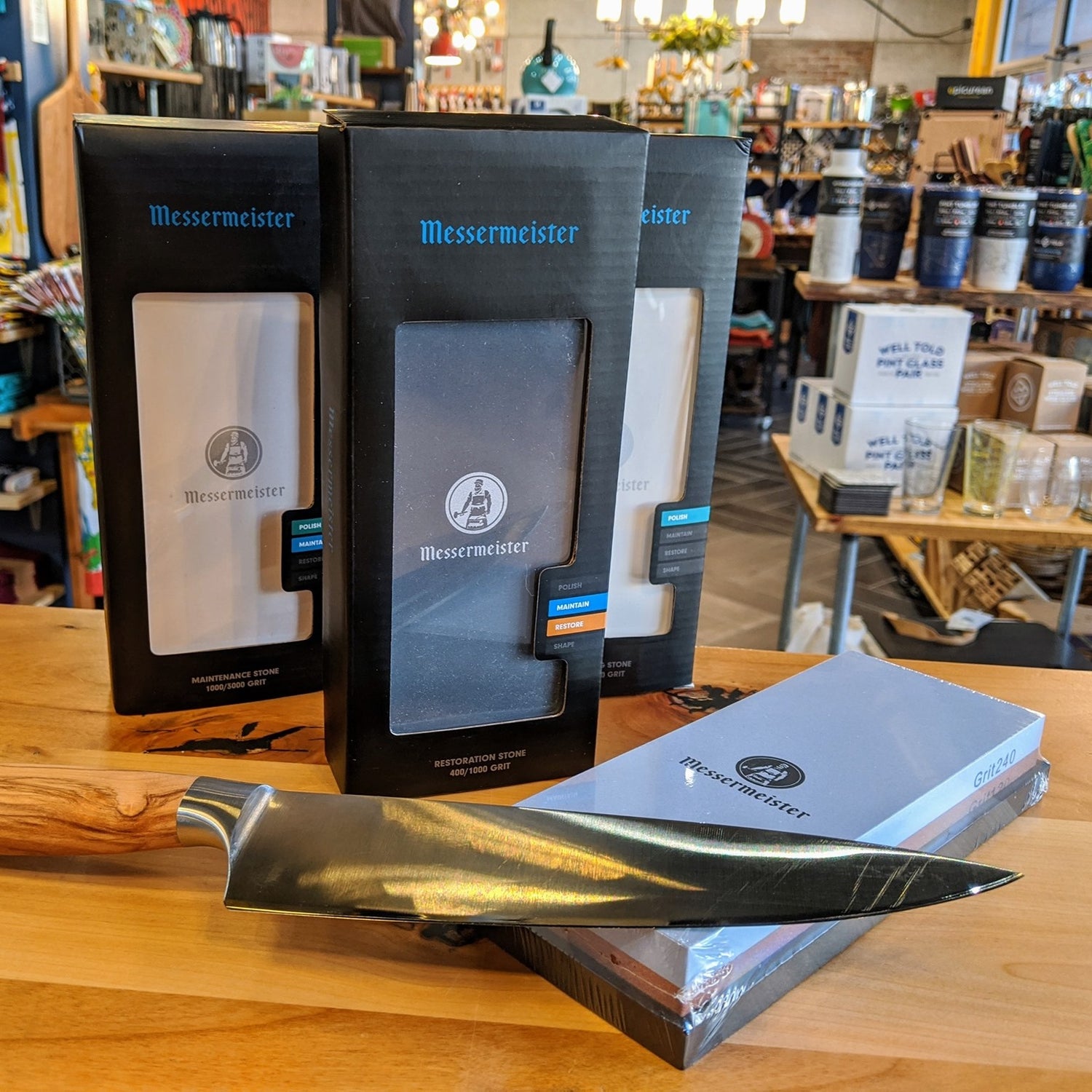
What about sharpening my knives at home?
There's nothing like a whetstone if you're looking for the ultimate result -- we sell a variety of grits for your home sharpening needs. Be warned, whetstones require a certain amount of skill and muscle memory to use. If you're considering picking up hand-sharpening as a hobby, we like Youtuber Ethan Chlebowski's introductory tutorial.
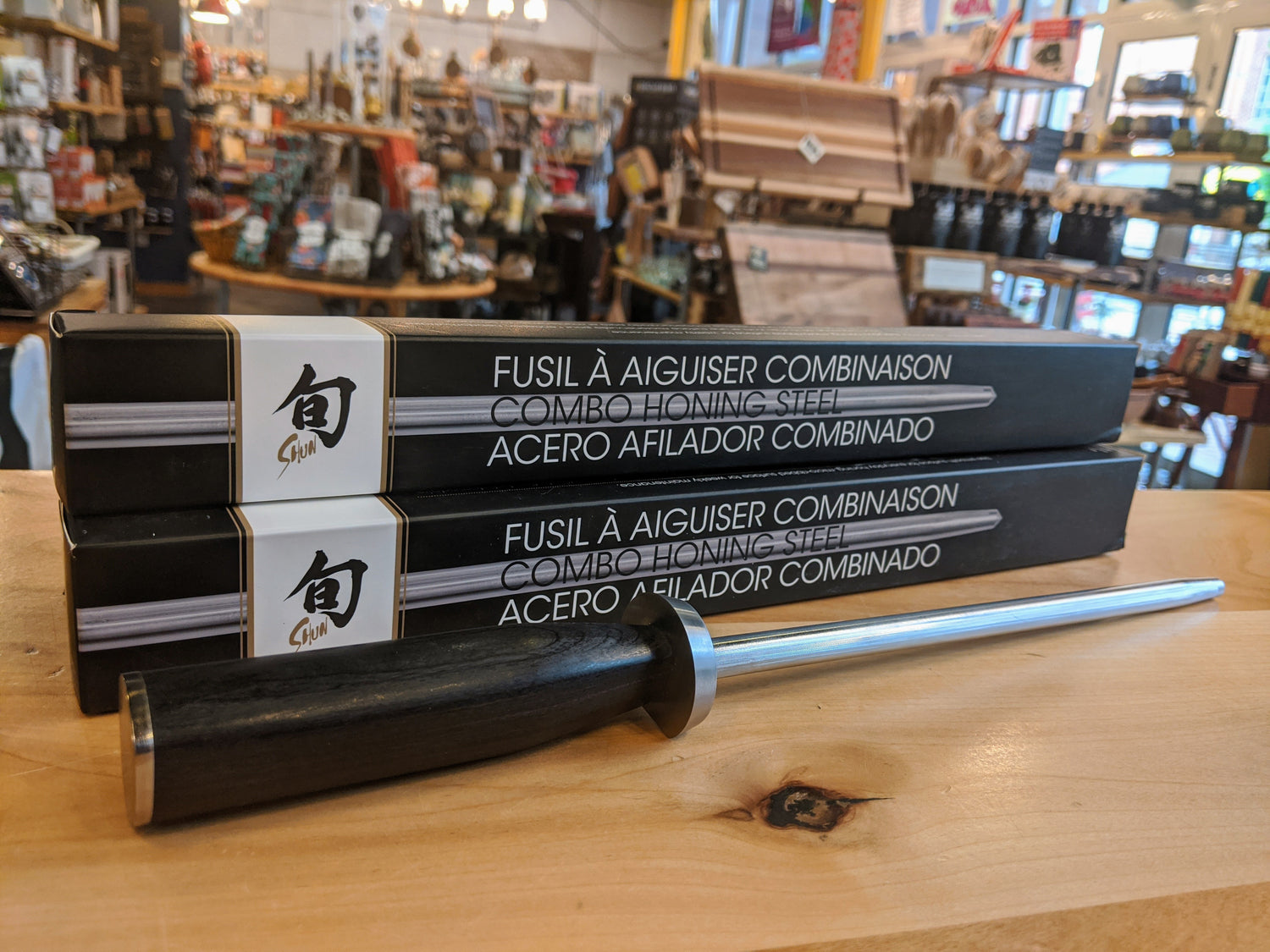
Don't forget the honing rod
Whether you choose to use our sharpening services or give it a shot yourself at home, you'll want a quality honing rod to keep your blades fresh in between sharpenings. Stop by the store to take a look at what's available.
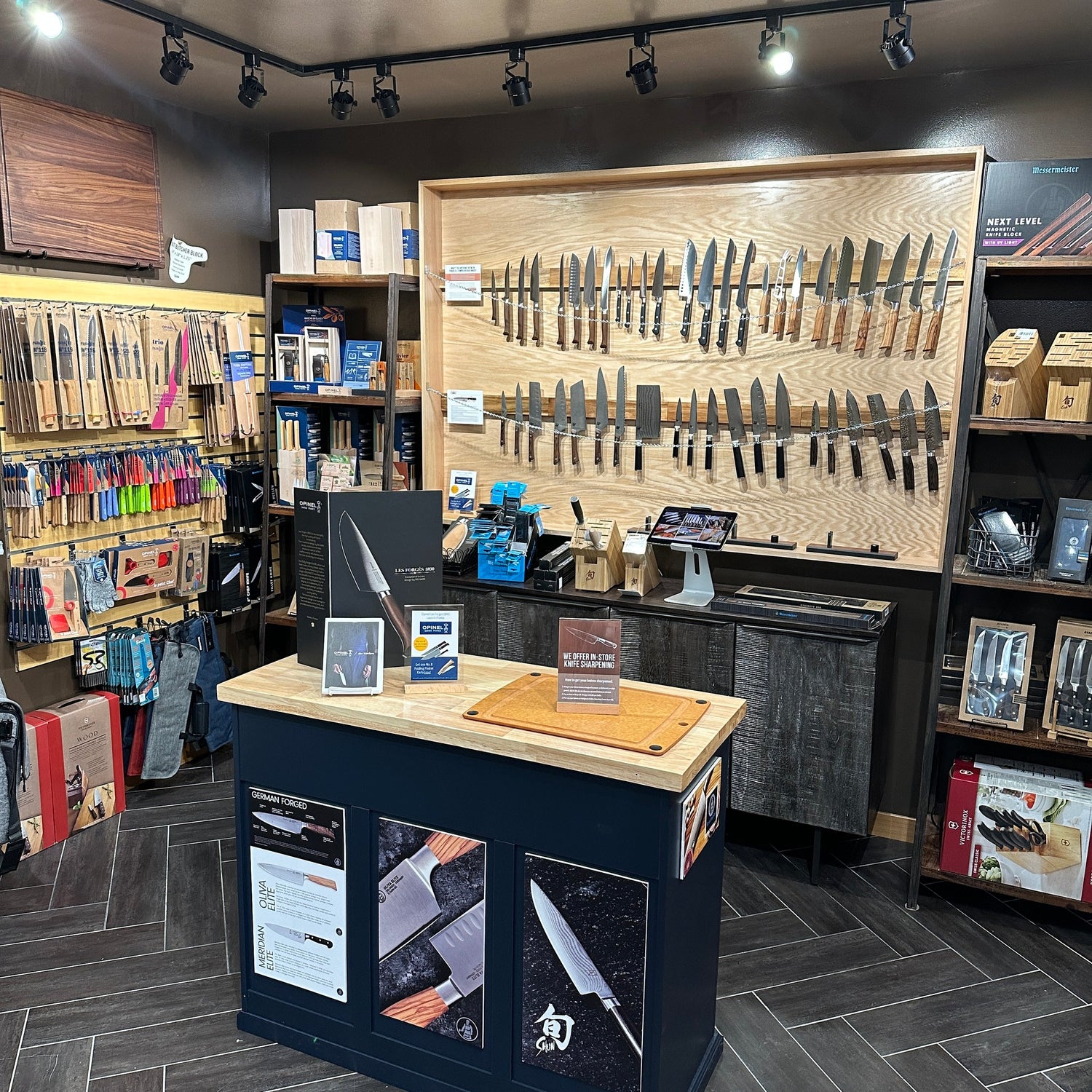
What knives to we sell?
We are proud to offer a selection of forged knives from the German knife-maker Messermeister, Japanese-made Shuns and the French company Opinel. We also have available a collection of knives from Victorinox's popular Swiss Classic line, Victorinox's rosewood line and Opinel's Parallele series. Visit the store to learn more about what we have available from our staff.
